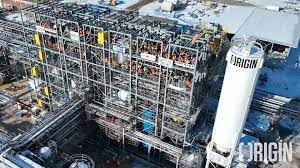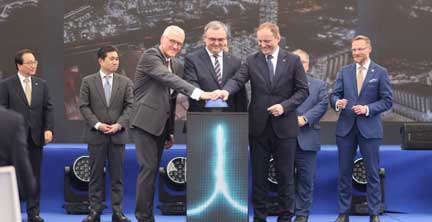Expansions: Origin Materials starts up world’s first CMF/HTC plant in Canada; Grupa Azoty launches PP production at Polimery Police

US firm Origin Materials, a carbon negative materials company, says it has begun start-up of Origin 1, what is said to be the world’s first commercial CMF (chloromethyl furfural) and hydrothermal carbon (HTC) plant, located in Sarnia, Ontario. A fundamental chemical building block, CMF, to be available at commercial scale for the first time is a precursor for PET plastic while HTC is for tyres, amongst the applications. For over a decade, Origin has developed a platform for turning the carbon found in inexpensive, plentiful, non-food biomass such as sustainable wood residues into useful materials while capturing carbon in the process.
The plant represents a significant scale-up of Origin’s technology platform for converting sustainable wood residues into versatile intermediate chemicals.
The new plant will supply industry with intermediate chemicals and materials that can be used across a wide range of end markets, including clothing, textiles, plastics, packaging, car parts, tyres, carpeting, toys, fuels, and more with a US$1 trillion addressable market.
CMF (chloromethyl furfural) is a versatile chemical building-block that can be used to make numerous downstream products, including para-xylene, which is the precursor to PET plastic, and FDCA (furandicarboxylic acid), which can be used in numerous sustainable products and materials such as the next-gen polymer PEF (polyethylene furanoate).
The plant will also produce HTC (hydrothermal carbon), whose applications include sustainable carbon black for automotive tyres.
John Bissell, Co-Founder/Co-CEO of Origin Materials, said, “We are thrilled to be making our intermediates available to industry on a scale never before achieved. The commercialisation of a molecule like CMF is historic, on the order of an ethylene. After working with CMF for over a decade at pilot scale, we couldn’t be more excited to begin commercial production here in Sarnia.”
Origin 1 will be operated to optimally fulfill customer demand around qualification and sampling. The plant is expected to play a key role in the development of higher-value products and applications for CMF, HTC, and other co-products. These higher value products are expected to be produced and sold at world-scale from future plants, including Origin 2, Origin 3, and potentially licensed plants.

In other news, Poland’s Grupa Azoty has started up production of polypropylene (PP) at Polymery Police, said to be one of the largest projects in the European chemical industry. The new plant will produce 437,000 tonnes/year of PP and 429,000 tonnes/year of propylene. It will start marketing its Gryfilen PP products in the European market in August 2023.
According to the project’s schedule, PP production is to be launched during the plant’s commissioning phase. The plant’s production capacity will be gradually increased until its target parameters are achieved.
Polimery Police is Grupa Azoty Group’s new chemical complex based on state-of-the-art solutions: the Oleflex UOP technology for the production of polymer-quality propylene using the propane dehydrogenation (PDH) method and the Unipol Grace technology for the production of PP.
These technologies are said to help achieve, among others, low consumption of raw materials and energy. The PP plant ensures high flexibility of production, which is important in the evolving and strongly competitive European plastics market.
The Polimery Police complex also includes an Offshore Gas Terminal, complete with handling and storage infrastructure for sourcing production feedstock (propane and ethylene) by sea. The gas terminal is a key element of the Polimery Police project – it expands the commercial offering using sea transport not only for the group companies, but ultimately also for third parties.
The project is of strategic importance to the Polish industry as it significantly increases Poland’s plastics production capacity and reduces its trade gap in this area. With the new Offshore Gas Terminal, of European importance, Polimery Police also increases Poland’s energy and raw material independence. Thanks to its location in Police, the project enables the deliveries of raw materials (propane and ethylene) by sea and will give the Grupa Azoty Group more flexibility in sourcing supplies from around the world, which is critical in light of the recent geopolitical developments and the ensuing changes in the sources of raw material supplies.
“The importance of Polimery Police is twofold: first, it is the production of plastics, second – the production of hydrogen, that is the fuel of the future. It is estimated that the annual output of hydrogen to be obtained in the propane dehydrogenation process will reach nearly 17,000 tonnes. Hydrogen production in Police will consolidate the strong position enjoyed by the Grupa Azoty Group in hydrogen technologies,” said Tomasz Hinc, President of the Grupa Azoty Management Board.
The PP manufactured under the Gryfilen banner will comprise a portfolio of more than 30 products, including homopolymers, impact copolymers and random copolymers, which find application in such industries as the automotive, packaging, and home appliance sector.
The PLN7.2 billion Polimery Police complex is being constructed under an EPC contract. The contract was signed in 2019 between Grupa Azoty Polyolefins and its South Korean partner Hyundai Engineering Company. Construction work is scheduled for completion in the second half of 2023.
(PRA)
Subscribe to Get the Latest Updates from PRA Please click here
©2023 Plastics and Rubber Asia. All rights reserved.

©2023 Plastics and Rubber Asia. All rights reserved.
Home Terms & Conditions Privacy Policy Webmail Site Map About Us
















